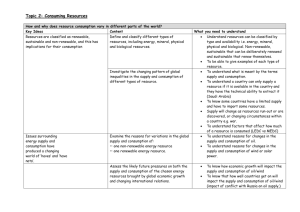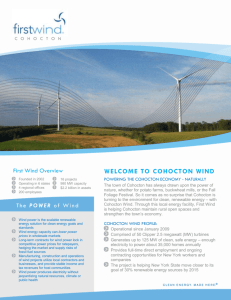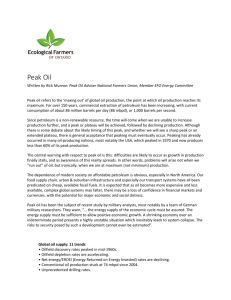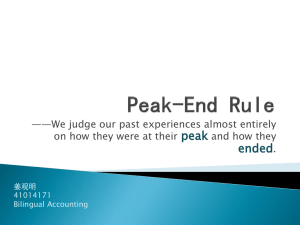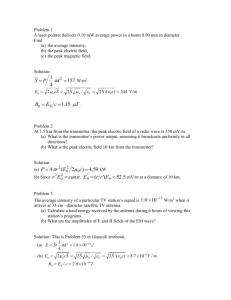Evolutionary Psychology and the future…
advertisement
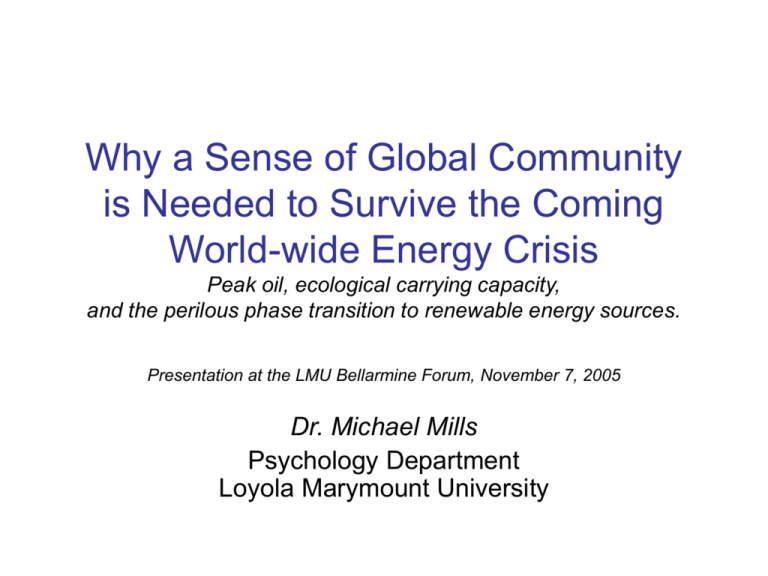
Why a Sense of Global Community is Needed to Survive the Coming World-wide Energy Crisis Peak oil, ecological carrying capacity, and the perilous phase transition to renewable energy sources. Presentation at the LMU Bellarmine Forum, November 7, 2005 Dr. Michael Mills Psychology Department Loyola Marymount University Some bad news, and some good news, about our future… • The bad news (according to ecologists and population biologists): – Thomas Malthus: • The population of a species increases geometrically • But the carrying capacity of the environment is finite, • Populations fluctuate between geometic growth and sudden die-offs – Our species may be no exception. – Carrying capacity of earth for humans is maybe 1 - 2 billion people (?) » And we are already have over 6 billion people… • The good news (according to “cornucopian technologists”): – Ray Kurzweil: • Scientific knowledge, like populations, grows geometrically too… – May allow us solve problems of carrying capacity, cure disease and aging, » Technology will help us overcome population overshoot and collapse. • The outcome of the Malthusian / Kurzwilian “grudge match:” – More than just an academic exercise • One of the two scenarios will likely occur – within your generation’s (college students’) lifetime. Overview of Presentation • Part 1: The Coming Worldwide Energy Crisis – The world is running out of cheap oil and other fossil fuels at a time when demand is increasing. • Part A: Malthusian Perspective: Possible worldwide economic problems, societal collapses, wars, and even population die-offs. • Part B: Kurzweilian Perspective: Technology will come to the rescue • Part 2: Why a Sense of Global Community is Needed to Survive the Coming World-wide Energy Crisis – Declining energy results in what game theorists call a “Negative-Sum Game” • This condition creates greater risks for social conflict and war. – How can people of the world cooperate to survive the energy crisis? Part 1: The Coming Energy Crisis • Part A: The Malthusian Perspective We have become “Oilcoholics.” • “Oil Storm” movie trailer: – FX Channel movie: “Oil Storm” (June, 2005). – Exemplifies our dangerous dependence on oil – What would happen if our access to oil was interrupted? • http://www.fxnetworks.com/shows/originals/oilstor m/main.html “Oil Storm” movie trailer: Thomas Malthus An Essay on the Principle of Population • "It is an obvious truth, which has been taken notice of by many writers, that population must always be kept down to the level of the means of subsistence; but no writer that the Author recollects has inquired particularly into the means by which this level is effected..." -- Thomas Malthus, 1798 An Essay on the Principle of Population • http://www.ac.wwu.edu/~steph an/malthus/malthus.0.html Population in a Petri dish (from: http://321energy.com/editorials/petch/petch070505.html) Geometric rates of increase in a finite world… Source: Dr. Albert Bartlett http://www.hawaii.gov/dbedt/ert/symposium/bartlett/bartlett.html The last minutes in the petri dish. 11:54 a.m. 1/64 full (1.5%) 63/64 empty 11:55 a.m. 1/32 full (3%) 31/32 empty 11:56 a.m. 1/16 full (6%) 15/16 empty 11:57 a.m. 1/8 full (12%) 7/8 empty 11:58 a.m. 1/4 full (25%) 3/4 empty 11:59 a.m. 1/2 full (50%) 1/2 empty 12:00 noon full (100%) 0% empty “The Introduction, Increase and Crash of Reindeer on St. Matthew Island”, by David Klein • 20 reindeer were introduced to St. Matthew Island in 1944 • Lots to eat, no predators • Population exploded • By 1963, the density of the reindeer on the island had reached 47 per square mile • They ate all the lichens (their food) on the island • In 1963, there was a die-off – about 6,000 reindeer starved to death • http://dieoff.org/page80.htm “The Introduction, Increase and Crash of Humans on Easter Island…” • A few humans arrived about 400 A.D. • Population exploded to as many as 20,000 • They cut down trees to move the stone statues • No trees = no boats, no top soil • About 1700 AD – die off of up to 18,000 people due to starvation and cannibalism. • “Easter Island is Earth writ small” – Jared Diamond Imagine the world as a petri dish “The Introduction, Increase and Crash of Humans on Earth Island…” • The essential energy resource to support industrial/technological civilization: oil – Sobering Fact: There is no energy-equivalent substitute for oil, • in terms of its advantages of energy density, transportability, range, safety and cost. – Also, oil is used to make fertilizer to grow food, and in many everyday products (plastics, etc.) – Oil has unique advantages for transportation: • Imagine trying to fly an airplane on a non-oil power source: Wood? Coal? Electricity? Nuclear? Hydrogen? – Problem: like trees on Easter Island, oil is a finite resource. And, we are gradually running out… Peak Oil Discoverer M. King Hubbert 1903-1989 • Shell Oil Geologist / Petroleum Scientist – Highly qualified and intellectually courageous • In 1954 he predicted that U.S. oil would peak about 1970 – Universally criticized at the time – After 1970 he became highly respected • In 1984 Hubbert predicted world peak oil in the early 2000s PEAK OIL: When you plot the production of an aggregate of oil fields over time you get roughly a bell curve Mid point 1st half Top of the curve 2nd half USA Oil Peaked in 1970 http://www.oilcrisis.com/de/lecture.html Peaking Oil and Gas Iran peaked: 1974 Russia peaked: 1987 Saudi Arabia peak – 2005? • In 2005 natural “gas production has peaked in North America," -- Exxon Chief Executive Lee Raymond (Reuters, June 21, 2005) Jean Laherr`ere, Estimates of Oil Reserves, paper presented at the EMF/IEA/IEW meeting in Laxenburg, Austria, June 19, 2001. http://www.iiasa.ac.at/Research/ECS/IEW2001/pdffiles/Papers/Laherrere-long.pdf Crude oil production by the world's largest private oil companies is in decline as of first half of 2005. How much time do we have left? Another related problem: Oil Demand-Production Cross-Over • Oil demand now exceeds supply. • New sources of increased oil demand: China and India • Source: http://money.cnn.com/2005/08/12/markets/oil.reut/in dex.htm Oil demand expected to double in 25 years, while oil reserves will be plummeting. Demand for oil is increasing, but oil production is decreasing. The red portion represents demand short fall. Result: oil prices go through the roof starting in 2005… Exxon-Mobil Report, Oct. 2004 DOCUMENTARY "THE END OF SUBURBIA" SHOWING IN OTTAWA If this is such a serious problem, why haven’t we heard about it? • Time horizons: – – – – Business: Annual Profits Government: Next election (4 – 6 years) Media: Dramatic headlines of current events People in general: • in ancestral environment, life span about 35 years -- discount future events over current events • Denial? – Nothing like this has ever happened before • Or, if it has (1970s oil shocks), problem quickly reversed • Jiminy Cricket syndrome – technology to the rescue! • Loss Aversion – invested in current infrastructure – Dislike the idea of change, especially, reducing consumption. But… the mass media (both fiction and non-fiction) is starting to catch on… • "How to Kick the Oil Habit" – Time Magazine, Oct. 23, 2005 – "If this explosion of (renewable energy) innovation has a problem, however, it may be that the developments are coming too late to allow a smooth transition to the postpetroleum era." Chevron TV ad. http://www.chevron.com/about/advertising/ Chevron TV ad. Exxon Energy Video Source: http://exxonmobil.com/corporate/Campaign/Campaign_energychallenge_home.asp Video Clip (fiction): • “Syrinia” movie trailer: – Those who control oil, control the world. – Increasing international conflict (“resource wars”) over the remaining, dwindling oil supplies. – To be released in December, 2005. • http://movies.yahoo.com/feature/syrianaqt.html Non-Fiction • Article: “Outcome Grim at Oil War Game -Former Officials Fail to Prevent Recession in Mock Energy Crisis” – By John Mintz, Washington Post Staff Writer Friday, June 24, 2005; Page A19 • “The United States would be all but powerless to protect the American economy in the face of a catastrophic disruption of oil markets, high-level participants in a war game concluded yesterday.” Declining oil production & rising demand = ever rising gas prices • Rising gas prices (hypothetical): – – – – – – – 2005: $2.60/gallon 2006: $3.25/gallon? 2007: $4.10/gallon? 2008: $5.95/gallon? 2009: $11.54/gallon? 2010: $16.82/gallon? 2015: $??? Peak Oil and Economic Effects http://www.theoildrum.com/story/2005/8/24/161535/296#comments Recent Quotes: • "We're all going to have to diversify away from hydrocarbons over time.” -- President George W. Bush, April 19, 2005 • “Doing nothing or doing too little too late will lead to a global economic and geopolitical tsunami with potentially devastating ramifications.” -- U.S. Congressman Roscoe Bartlet. (2005) • "Peaking (oil) will be catastrophic... We are about to drive the car over the cliff and say, `Oh my God, What have we done?’” -- Robert L. Hirsch, US Dept. of Energy consultant, 2005. • “After you drive a car off a cliff, it’s too late to hit the brakes. In effect, we have gone over the edge of the cliff.” -- Kenneth Deffeyes, author “Beyond Oil” Recent Quotes: • (Peak oil) “…is one of the biggest social and political challenges for this century.” – Robert K. Kaufmann, Professor, Center for Energy & Environmental Studies, Boston University. (2005) • “We’ve embarked on the beginning of the last days of the age of oil.” – Mike Bowlin, Chairman and CEO, ARCO, 1999 and Chairman, American Petroleum Institute (2005) • “My father rode a camel. I drive a car. My son flies a jet airplane. His son will ride a camel.” --Saudi adage • “Whether … (a transition to renewable energy) will come in time to avoid an energy crunch depends in part on how high a priority we give energy research and development.” – Richard A. Kerr and Robert F. Service, Science, Vol 309, Issue 5731, 101 , 1 July 2005 Have Saudi’s Overstated their Oil Reserves? • Investment banker Matthew Simmons. • Highlights many discrepancies between Saudi Arabia's actual production potential and its seemingly extravagant resource claims. • May in fact be peaking soon. What might we expect in near future? • Ever rising gasoline prices. • Fewer recreational “road trips.” • More use of trains. • Airline travel ever more expensive. • Commuting from the suburbs ever more expensive. • Electricity, gas, heating oil, become ever more expensive. • Rising inflation – everything will cost more (due to rising shipping and production costs). • Economic recessions. • International conflict over oil resources. Worst case future scenarios: Economic recessions. We might see a return of the Great Depression. Maybe a “Malthusian catastrophe” (e.g., population dieoff). Wonder what life would be like without cheap oil? •We already have examples: North Korea and Cuba. •LA Times Article: – "GLIMPSES OF A HERMIT NATION A decade after a massive famine, North Koreans are still struggling. In Chongjin, deprivation spurs change.” By Barbara Demick, LA Times Staff Writer, July 3, 2005. – “…outsiders know relatively little about its people or the miseries they have endured since a famine in the mid-1990s wiped out an estimated 2 million people.” MSNBC.com article: “Think it's hot? Be glad you're not in Cuba - Daily blackouts putting nation in a bad mood.” July 12, 2005 • • • http://www.msnbc.msn.com/id/8500543/print/1/displaymode/1098/ “HAVANA — Summer’s searing temperatures getting you down? Just be glad you don’t live in Cuba where daily blackouts make it about impossible to beat this year’s record heat.” “At first, the blackouts were tolerable, four hours twice a week. But by mid-month they had grown to daily six-hour ordeals.” “Still, she considers herself lucky. ‘We live on the top floor apartment so we get to use the roof to sleep.” People’s biggest complaint has to do with the nighttime blackouts. It’s hard to sleep without the use of an air conditioner or fan.’” • Cuba at Night Cuba’s vs. N. Korea Oil Crisis: Why was Cuba able to avoid famine? • Cuba had a similar oil crisis when the Soviet Union collapsed, but, unlike North Korea, they were able to avoid famine. • Why? How? Historical Energy Sources: Energy Phase Transitions • Wood, which was replaced by • Coal, in the 1800s, which was replaced by • Oil, in the 1900s, which must be replaced by a renewable energy source… • _________ ? in the 2000s (?) – Solar? – Wind? – Nuclear Fusion (hot or cold)? (Current nuclear fission is finite and non-renewable) Energy Phase Transitions • Each previous “energy phase transition” wood -> coal -> oil was to a more dense energy source. • PROBLEMS WE FACE NOW – Energy Density: All clean, renewable energy sources are far less dense – Demand for wood and coal could be met when they were needed. • But demand for oil will rise inexorably, as production inexorably decreases. Demand cannot be met. Perilous Energy Phase Transition Period to renewable energy sources • Do we have enough time? – Or, is it already too late? • Transition period is very risky. – Huge infrastructure changes / investments • It takes time to transition smoothly – we may not have started soon enough. – Costs of infrastructure change will be enormous – We need to start immediately. The Kurzweilian Perspective: Scientific technology to the rescue! • Part B: – Ray Kurzweil: • Technological knowledge will increase geometrically • Exponential explosion of scientific knowledge will allow us solve problems of carrying capacity, find unlimited energy sources (e.g., fusion), cure disease and aging, and to become immortal. The Law of Accelerating Returns • Ray Kurzweil argues: – Machine intelligence will surpass human intelligence, leading to “The Singularity” -- Technological change so rapid and profound it represents a rupture in the fabric of human history – Merger of biological and non-biological intelligence http://www.kurzweilai.net/article s/art0134.html?printable=1 Possible sources of a breakthrough “techno energy rescue”? • Nuclear fusion – cold or hot? – E.g., “Focus Fusion” -- http://www.opensourceenergy.org/txtlstvw.aspx?LstID=95defd1e-f25c-4a33-8002a69aca481e6a • “Hydrino Energy”? – Controversial “classical quantum mechanics” – Posits that an electron can move much closer to the proton at the heart of a hydrogen atom and, in doing so, releases substantial amounts of energy • http://www.guardian.co.uk/science/story/0,3605,1627424,00.html / http://www.hydrino.org/ http://physicsweb.org/articles/news/9/8/4 • Methane hydrates (non-renewable)? – Buried beneath the seabed and Arctic permafrost. A mixture of ice and natural gas, • May contain more carbon than existing reserves of oil, coal and gas put together. • But – can it be extracted? Current renewable energy technology (no techo-fix needed). • Solar concentrators can be used for: Electrical Power Generation, Hydrogen Production • 100 square mile area could provide all electrical needs of U.S. • Another 100 sq miles could provide all of our transportation energy • From: http://www.shec-labs.com/products.php • A Solar Concentrator: 100 square miles – solar PV could meet the entire U.S. yearly electrical needs. http://www.energycooperation.org/solarh2.htm Part 1 Conclusion: For today’s college students, in your lifetime … • From the baby boom generation to yours: – Sorry, we used up most of the cheap oil… – But, we developed a foundation of scientific knowledge that might help rescue you • but we must start on a crash program immediately to transition to renewable energy… • Within 20 – 50 years, you will likely know who “won” – either: – Malthusian scenario: Economic collapse and perhaps a significant world population die off – Kurzweilian scenario : Knowledge “singularity” – a scientific/technological energy transition rescue Part 2: Global Cooperation During the Perilous Phase Transition to Renewable Energy • “The life contest is primarily a competition for available energy.” – Ludwig Boltzman, Physicist (1886) Der zweite Hauptsatz der mechanischen Waermetheorie, 1886 (Georold, Vienna) p. 210. • E.G., contest for the energy contained in food. • Now, also a contest for fossil fuels • “Energy determines what you can do, and often you can do what you will do.” – Fredric Cottrell, Energy and Society (1955) • “Whoever controls the oil, controls the world.” How can we avoid an economic collapse, even a Malthusian die off? • Depletion of fossil fuels will lower energy availability by about 3% 6% each year, every year, from here on out… – …not pretty. • We have to immediately – conserve oil and gas, and – rapidly transition to renewable energy (solar, wind, etc.) – hope for an extraordinary energy technology rescue (e.g., fusion, etc.) • It is too risky now to rely only on a possible future “techno-fix” • Need now: – World-wide conservation of fossil fuels – Build infrastructure for current renewable energy – Invest in research to try to find a breakthrough “techo-fix” Peaking of World Oil Production: Impacts, Mitigation, & Risk Management Led by Dr. Robert Hirsch, U.S. Department of Energy (2005) • If a crash program to switch from oil to renewable energy begins: – 0 years before Peak Oil: Leaves the world with a significant liquid fuel deficit for more than two decades. • Severe economic disruptions. – 10 years before Peak Oil: Helps considerably but still leaves a liquid fuels shortfall for roughly a decade after the time that oil would have peaked. • Moderate economic disruptions. – 20 years before Peak Oil: Appears to offer the possibility of avoiding a world liquid fuels shortfall for the forecast period. • • Slight economic disruptions. Hirsch: “The world has never confronted a problem like this, and the failure to act on a timely basis could have debilitating impacts on the world economy. Risk minimization requires the implementation of mitigation measures well prior to peaking.” – Source: http://www.projectcensored.org/newsflash/The_Hirsch_Report_Proj_Cens.pdf Problem: Human Nature • From a biological perspective: – Humans are designed to maximize their own reproductive output (“Darwinian Fitness”) – And help family and close kin (“inclusive fitness”) – We’re not much inclined to help non-kin strangers. – Examples: • “Tragedy of the Commons” • “Free-rider problem” Who would you save? • There are 2 doors • Behind the door on the right is your child, who will die if you don’t open that door. • Behind the door on the left is someone else’s child, who will die if you don’t open that door. • You can only open one door. • Which door do you open. Why? When will people tend to cooperate with others? • …when dealing with genetic relatives (Hamilton’s “inclusive fitness theory”). • …when repeated interactions with non-relatives offer reciprocal benefits (Triver’s “tit-for-tat reciprocity” theory) – And cheating (“temptation”) is reliably punished. • …when dealing with non-relatives, when social rules against cheating are usually enforced, and the resource “pie” is growing (Ginits, et al., “generalized reciprocity” – e.g., “follow the rules, even when no-one is watching”). ‘Hamilton’s Rule’. – r = degree of genetic relatedness – b = benefit (in reproductive terms), to related individual – c = cost (in reproductive terms) to altruist – Altruism will occur when: • c (cost to you) < (r) b (benefit to kin) When will you be altruistic? Answer: when cost to you < (r) x (benefit to kin) • c < rb -- plug in some sample values… • To your siblings (share ½ of your genes): – When benefit to a sib is 2x cost to you: 1 < (.5) 2 -- cost to you < (r) benefit to sib -- e.g, c < rb Only when it will cost you less than $1 to get your sib at least $2 • To ½ sibs, aunt/uncle, niece/nephew (r = .25) 1 < (.25) 4 When benefits to this kin member is 4x the cost to you. Only when it will cost you less than $1 to get your nephew at least $4 • r = .125 8x benefit to other vs. cost to you r = .062 16x benefit vs. cost to you r = .031 32x benefit vs. cost to you r = .015 64x benefit vs. cost to you • Sad bottom line: As r declines, altruism will exponentially decline… Arab Adage • Me against my brother. • Me and my brother against my cousins • Me, my brother, and my cousins against the village • Me, my brother, my cousins and my village against the other village” Game Theory: Types of Social Interactions You Other Person Gain Lose Gain Reciprocity/ Mutualism Altruism Lose Selfishness Spite (inclusive fitness theory) Game Theory and Peak Oil Everyone Else’s Oil Consumption Your Oil Consumption: Reduce Increase Reduce Reward, Reward Sucker, Temptation Increase Temptation, Sucker Punishment, Punishment Payoffs: T > R > P > S Problem: Cooperation is Far Less Likely in a Negative Sum Game • Generalized reciprocity works well when the overall resource pie is growing (a “positive sum game”). – The costs of cooperating are low. • But Peak Oil crisis is a “shrinking energy pie” situation (a “negative sum game”). • Peak oil requires the whole world to cooperate as resources grow scarce. How can that be achieved? Peak Oil Bell Curve Ascent and Decline Strategies • Peak Oil Slope Ascent Strategies: – Served us well on peak oil ascent: • Free market capitalism, consumerism, globalism, un-taxed energy use, no incentives for renewable energy use, short term time horizon • But now, it is dangerous if we cling to those “Ascent Values” • Peak Oil Slope Decline Strategies: – Requires new ways of thinking. • Government: conservation and renewable energy incentives, taxes on excessive energy use, RIMINI Protocol (shared burdens) • Businesses and Individuals: Localization (food, manufacturing, etc.), energy conservation, use of renewable energy. Imagine…you are on Easter Island • How do you convince your tribe, and other tribes, to create a “sustainable timber industry” on the island? • Instead of businesses “plundering” the planet, is “sustainable capitalism” possible? THE RIMINI PROTOCOL http://www.peakoil.ie/protocol • Kyoto Protocol deals with climate change. • “Oil Depletion Protocol” (RIMINI Protocol) deals with Peak Oil. – “Each importing country shall reduce its imports to match the current World Depletion Rate.” • That is, if World Depletion Rate is 3%, the U.S. (and all other countries), must reduce it’s oil imports by 3% per year. – That is: agreement for each nation to share the declining energy burden proportionately. • The stakes are very high -- if every nation follows these guidelines, we may be able to avoid conflict and resource wars over the remaining fossil energy supplies as they grow ever more scarce and precious. Conclusion • Peak oil means a shrinking fossil fuel “energy pie,” and higher oil costs, each and every year. • Energy transition time window: We have a short window of time to transition to renewable energy. We need to start yesterday. – We can hope for an energy techno-breakthrough (e.g., fusion), but we better not count on it. • World-wide cooperation vs. human nature – Avoiding conflict and resource wars over shrinking resources will require world-wide cooperation and conservation – We need to see the threat as a common one that transcends borders, cultures and religions. – Are we smarter than yeast in the petri dish? Can we “transcend” our human nature? To download a copy of this presentation, see: • www.DrMillsLMU.com/PeakOil.htm – Online in about a week.
